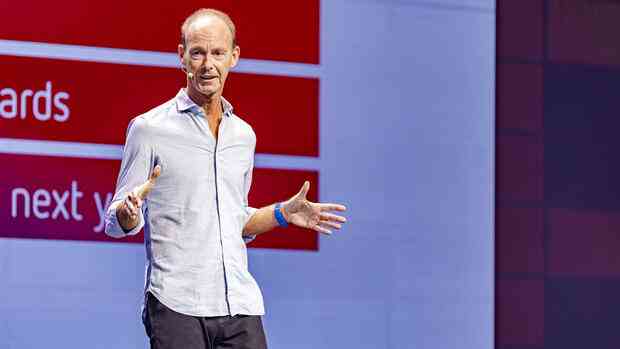Difficult phase for the Bertelsmann boss.
(Photo: Bertelsmann)
Bertelsmann boss Thomas Rabe is considered a numbers person. He explained the reduction of 700 out of 1900 jobs at the traditional Hamburg publishing house Gruner + Jahr (G + J) with the finances. “In 2022, after all deductions, the result was one million euros.” Without the job cuts, G+J’s EBITA, i.e. earnings before interest, taxes, depreciation and amortization, would have been “double-digit negative this year,” says Rabe.
A look at the annual report: In 2021, G+J still made an operating profit of 134 million euros. At that time, the company was still stating the Ebitda, i.e. the earnings before interest, taxes, depreciation and investments – a measure that is higher than the Ebita now mentioned by Rabe.
The fact is: in 2021 G+J made a three-digit million profit, and in 2023 there was a risk of a double-digit loss. That raises questions. Yes, the media industry may not be doing well. Yes, paper and logistics costs may have increased. And yes, advertising revenue is also likely to stay away because of the reluctant advertising companies. But these phenomena can hardly explain a loss within just two years.
It is possible that the numbers have not collapsed as much as Rabe is now suggesting. Before the merger, G+J owned a stake in the magazine “Spiegel” and the business of the fast-growing app platform Applike-Group. According to the annual report, these two businesses were the “drivers of the positive business development” at G+J. The Applike Group alone contributed an estimated 20 million euros to the profit. However, Rabe outsourced precisely those two units to another division of Bertelsmann before the merger – and now they no longer appear in G+J’s balance sheet.
>> Read more: “A shock” – RTL cuts 1000 jobs at Gruner + Jahr and at the Cologne headquarters
Rabe obviously wants to follow through with his plan to build “national media champions” with all his might. He expects better growth from the merger and the focus on the strong G+J brands.
In any case, he cannot be stopped: Rabe is not only the boss of Bertelsmann and the RTL Group, but also declared himself boss of RTL Germany in the summer.
And there are hardly any former top executives at G+J who might have argued more strongly for the well-being of Hamburg employees. They left – or had to leave the company. Just like Stephan Schaefer. The former G+J manager, an old hiking friend of Rabe’s, had to leave in the summer. Internally, he was considered too lax for this task. Rabe doesn’t have to be blamed for that.
More: Comment: The visionary Thomas Rabe failed
